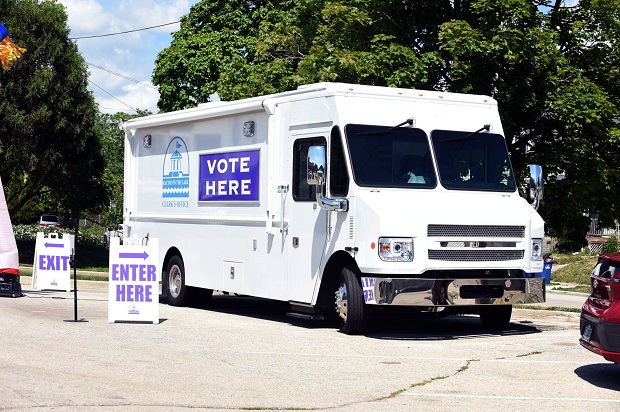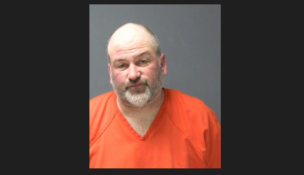Wisconsin Supreme Court rules against use of mobile voting vans
By: MaryBeth Matzek, Special to the Wisconsin Law Journal//June 13, 2024//
Wisconsin Supreme Court rules against use of mobile voting vans
By: MaryBeth Matzek, Special to the Wisconsin Law Journal//June 13, 2024//
A decision by the Wisconsin Supreme Court regarding voting locations in Racine delivered a win to both Democrats and Republicans.
While the Court ruled municipalities cannot use mobile election units as an alternate ballot site, it stayed an order allowing city clerks to go ahead and select alternate absentee ballot locations using criteria in place since 2016 for the upcoming August and November elections.
The Court stayed a Racine County circuit judge’s decision banning the use of mobile election units. The case stems from a December 2022 lawsuit filed by the Wisconsin Institute for Law and Liberty (WILL) on behalf of Racine County Republican Party Chairman Ken Brown alleging Racine city officials illegally used a voting van to collect absentee ballots around the city that year.
In January, Racine County circuit court judge ruled state law does not allow mobile voting sites to operate. Racine City Clerk Tara McMenamin and the Democratic National Committee then asked the state Supreme Court in February to review the case without letting any lower appellate courts rule on it first.
“We are happy that Racine’s illegal voting van will not be in use for the upcoming elections,” WILL attorney Lucas Vebber said in response to Wednesday’s ruling.
McMenamin said she pushed for the van to serve as a mobile voting site to facilitate early in-person voting two weeks before the election because it was too difficult to set up equipment at remote sites.
In the same case, the Court allowed a stay pending appeal of a circuit court’s decision reversing the Wisconsin Election Commission’s (WEC) ruling regarding the Racine city clerk’s compliance in selecting alternate absentee ballot sites, allowing city clerks to move ahead and select alternate absentee locations for the August and November elections.
With the August election two months away, the Court ruled there was a risk that the circuit court’s ruling regarding alternate absentee balloting locations would create confusion.
“Granting a stay will ensure that the status quo since 2016 continues to govern through the next election,” the Court wrote.
Timothy White, a spokesperson for President Joe Biden’s campaign in Wisconsin, said the portion of the order keeping the same criteria in place for picking early voting sites was a “win for democracy.”
Racine used the van for the first time for municipal elections for the spring 2022 elections. When the city again used it for the August 2022 primary, Brown filed a complaint with the WEC saying it was illegal. He said the van increased the chance for voter fraud and was only sent to Democratic regions of Racine to bolster turnout.
The van was purchased with grant money that the city received from the Center for Tech and Civic Life, a nonprofit funded by Facebook founder Mark Zuckerberg and his wife. Republicans were critical of the grants, calling the money “Zuckerbucks” that they say was used to tilt turnout in Democratic areas. Wisconsin voters in April approved a constitutional amendment banning the use of private money to help run elections.
The city of Racine, the Democratic National Committee and the Milwaukee-based advocacy group Black Leaders Organizing for Communities denied those claims and defended the legality of the van, saying there was no specific prohibition against it.
After the WEC ruled in the city’s favor that the van could be used, WILL filed its lawsuit. A Racine Court judge decided in WILL’s favor. The city filed an appeal but asked the Supreme Court to lift the stay order while the case was under appeal given the proximity of the elections.
In deciding against the use of the van, the Court said the van was placed in areas advantageous to Democrats, which violated the law. The Court said state law dictates that an advantage to a particular party can only be avoided if voters near the early voting location cast their ballots exactly the same way as voters who live in the immediate area of the municipal clerk’s office.
“The movants would not suffer irreparable injury without a stay, whereas Brown and the public interest would be harmed by a stay because it would allow activities the circuit court said were unlawful to continue pending appeal,” the Court wrote in arguing against implementing a stay in the circuit court’s decision while the case winds its way through the legal process.
Legal News
- Wisconsin Supreme Court to consider whether 175-year-old law bans abortion
- Wisconsin man facing bestiality and felony bail jumping charges
- Waukesha County woman indicted in National Health Care Fraud Law Enforcement Action
- Man sentenced to 15 months for fraud involving luxury vehicles
- Wisconsin Department of Justice Fire Marshal investigating fire that killed six
- Ozaukee County first responders save family of three, father and son on Milwaukee River
- Supreme Court sends Trump immunity case back to lower court, dimming chance of trial before election
- Brewers have American Family Field escalators inspected after malfunction results in 11 injuries
- US wants Boeing to plead guilty to fraud over fatal crashes, lawyers say
- GOP lawmakers in Wisconsin appeal ruling allowing disabled people to obtain ballots electronically
- 11 people injured when escalator malfunctions at Milwaukee ballpark
- Judge receives ethics fine after endorsing candidate
Case Digests
- Termination of Parental Rights
- First Amendment Rights
- Termination of Parental Rights
- Late Filing
- Real Estate-Attorney Fees
- Ineffective Assistance of Counsel
- Variance-Interpretation of Zoning Ordinances
- Sentencing
- Fourteenth Amendment’s Due Process Clause-Jury Instructions
- Unlawful Collection Practices-Evidence
- Sentencing-Vindictiveness
- Prisoner Grievances-Exhaustion of Administrative Remedies












